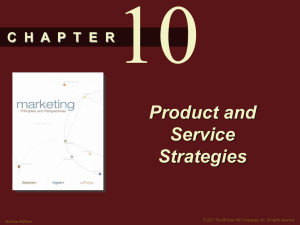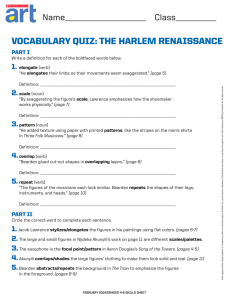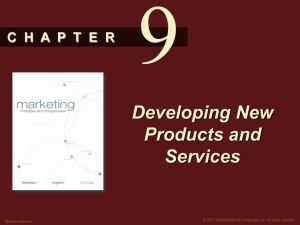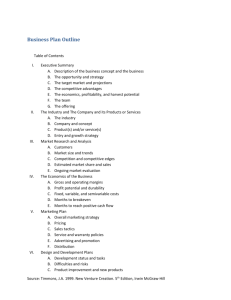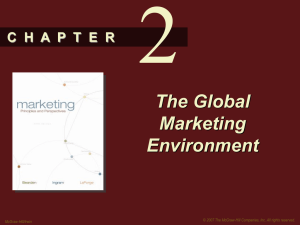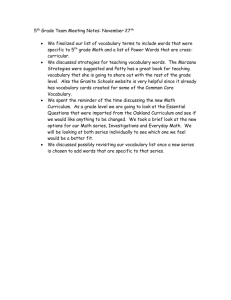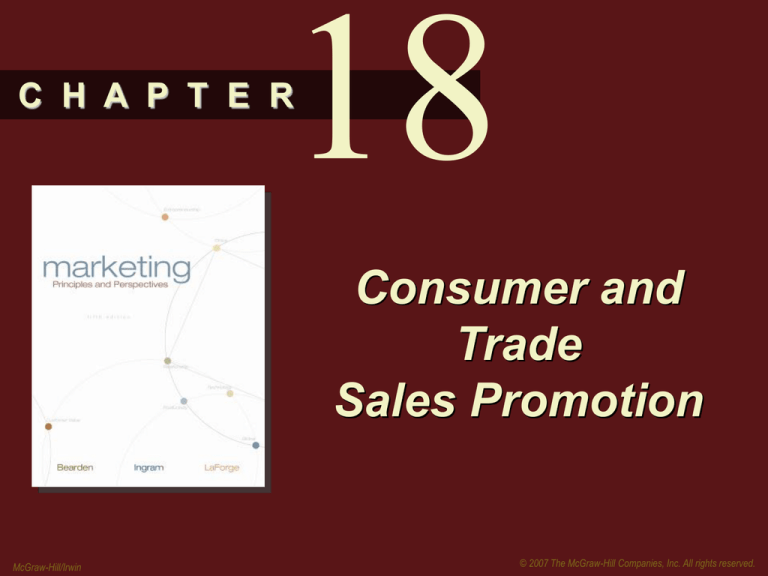
18
C H A P T E R
Consumer and
Trade
Sales Promotion
McGraw-Hill/Irwin
© 2007 The McGraw-Hill Companies, Inc. All rights reserved.
Learning Objectives
After studying this chapter, you should be able to:
Explain the role and significance of sales promotion in the
marketing communications mix.
Understand why sales promotion expenditures account for
a significant portion of many firms’ marketing
communications budgets.
Discuss the objectives and techniques of consumer sales
promotion.
Discuss the objectives and techniques of trade sales
promotion.
Explain the limitations of sales promotion.
Realize how deceptive and fraudulent sales promotion
victimizes both consumers and marketers.
Bearden Marketing 5th Ed
18-2
© 2007 The McGraw-Hill Companies, Inc. All rights reserved.
McDonald’s
McDonald’s, long a leading user of
special promotions to attract
consumers to its stores, made
industry headlines with its Monopoly
game promotion in 2004.
McDonald’s teamed with
WildTangent, a major manufacturer of
online games, which produced online
demo games modified to include
McDonald’s product placements.
McDonald’s then used the games as
prizes in its Monopoly contest, and
promotion partner WildTangent
benefited from the introduction of its
games to millions of prospective
game customers.
Bearden Marketing 5th Ed
18-3
© 2007 The McGraw-Hill Companies, Inc. All rights reserved.
The Role of Sales Promotion
Sales
Promotion
Consists of media and nonmedia
marketing communications employed
for a predetermined, limited time to
stimulate trial, increase consumer
demand, or improve product
availability.
Consumer sales promotion is
directed at consumers.
Trade sales promotion is directed at
resellers.
Bearden Marketing 5th Ed
18-4
© 2007 The McGraw-Hill Companies, Inc. All rights reserved.
Sales Promotion
Sales
Promotion
Expenditures
Consumer
Factors
The Significance
of
Sales Promotion
Increased Retail
Power
Bearden Marketing 5th Ed
Impact of
Technology
18-5
© 2007 The McGraw-Hill Companies, Inc. All rights reserved.
10 Commandments of Sale Promotion
1. Set specific objectives. Undisciplined, undirected creative
work is a waste of time and resources.
2. Know how basic promotion techniques work. A
sweepstakes shouldn’t be used to encourage multiple
purchases or a refund to get new customers. A price-off deal
can’t reverse a brand’s downward sales trend.
3. Use simple, attention-getting copy. Most promotions are
built around a simple idea: “save 75 cents.” Emphasize the
idea, and don’t try to be cute.
4. Use contemporary, easy-to-track graphics. Don’t expect
to fit 500 words and 20 illustrations into a quarter-page,
freestanding insert.
5. Clearly communicate the concept. Words and graphics
must work together to get the message across.
Bearden Marketing 5th Ed
18-6
© 2007 The McGraw-Hill Companies, Inc. All rights reserved.
10 Commandments of Sale Promotion
6. Reinforce the brand’s advertising message. Tie
promotions to the brand’s ad campaign.
7. Support the brand’s positioning and image. This is
especially important for image-sensitive brands and
categories, like family-oriented Kraft.
8. Coordinate promotional efforts with other marketing
plans. Be sure to coordinate schedules and plans. A
consumer promotion should occur simultaneously with a
trade promotion; a free-sample promotion should be timed in
conjunction with the introduction of a new line.
9. Know the media you work through. Determine which
media will work best. Should samples be distributed in stores,
door-to-door, or through direct mail? Does the promotion
need newspaper or magazine support?
10. Involve the trade. Build relationships with key resellers.
Bearden Marketing 5th Ed
18-7
© 2007 The McGraw-Hill Companies, Inc. All rights reserved.
Consumer Sales Promotion
Objectives of Consumer Sales Promotion:
Stimulate trial
Increase consumer inventory and consumption
Encourage repurchase
Neutralize competitors
Increase sales of complementary products
Stimulate impulse purchasing
Allow flexible pricing
Bearden Marketing 5th Ed
18-8
© 2007 The McGraw-Hill Companies, Inc. All rights reserved.
Consumer Sales Promotion Techniques
Price Deals
Coupons
A price deal is a temporary reduction
in the price of a product. There are
two primary types of price deals:
cents-off deals and price-pack deals.
A coupon is typically a printed
certificate giving the bearer a stated
price reduction or special value on a
specific product, generally for a
specific period.
more
Bearden Marketing 5th Ed
18-9
© 2007 The McGraw-Hill Companies, Inc. All rights reserved.
Consumer Sales Promotion Techniques
Rebates
CrossPromotions
A rebate is a cash reimbursement to
a buyer for purchasing a product.
The consumer must mail a rebate
form, the purchase receipt, and proof
of purchase to the manufacturer.
A cross-promotion (tie-in), is the
collaboration of two or more firms in
a sales promotion. Crosspromotions
enhance the communications effort
of all the participating firms.
more
Bearden Marketing 5th Ed
18-10
© 2007 The McGraw-Hill Companies, Inc. All rights reserved.
Consumer Sales Promotion Techniques
Contests,
Games
Premiums
A contest offers prizes based on the
skill of contestants. A sweepstakes
offers prizes based on a chance
drawing of participants’ names.
Games are similar to sweepstakes,
but they cover a longer period.
An item given free or at a bargain
price to encourage the consumer to
buy is called a premium.
more
Bearden Marketing 5th Ed
18-11
© 2007 The McGraw-Hill Companies, Inc. All rights reserved.
Consumer Sales Promotion Techniques
Sampling
Advertising
Specialities
Bearden Marketing 5th Ed
A sample is a small size of a
product made available to
prospective purchasers, usually free
of charge.
An advertising specialty, also
called a promotional product, is an
item of useful or interesting
merchandise given away free of
charge and typically carrying an
imprinted name or message.
18-12
© 2007 The McGraw-Hill Companies, Inc. All rights reserved.
Trade Sales Promotion
Objectives of Trade Sales Promotion:
Gain/maintain distribution
Influence resellers to promote product
Influence resellers to offer price discount
Increase reseller inventory
Defend against competitors
Avoid reduction of normal prices
Bearden Marketing 5th Ed
18-13
© 2007 The McGraw-Hill Companies, Inc. All rights reserved.
Trade Sales Promotion Techniques
Trade
Allowances
Dealer
Loaders
Trade allowances are short-term
special allowances, discounts, or
deals granted to resellers as an
incentive to stock, feature, or in some
way participate in the cooperative
promotion of a product.
A dealer loader is a premium given
to a reseller to encourage
development of a special display or
product offering.
more
Bearden Marketing 5th Ed
18-14
© 2007 The McGraw-Hill Companies, Inc. All rights reserved.
Trade Sales Promotion Techniques
Trade
Contests
A trade contest typically associates
prizes with sales of the sponsor’s
product. Trade contests generate
interest, which makes them useful for
motivating resellers.
Point-ofPurchase
Display
Point-of-purchase displays are
generally used at the retail level to
call customer attention to a featured
product.
more
Bearden Marketing 5th Ed
18-15
© 2007 The McGraw-Hill Companies, Inc. All rights reserved.
Trade Sales Promotion Techniques
Trade Shows
Training
Programs
A trade show is a periodic, semipublic event at which suppliers rent
booths to display products and
provide information to potential
buyers.
Some manufacturers sponsor or pay
for training programs for customer
employees.
more
Bearden Marketing 5th Ed
18-16
© 2007 The McGraw-Hill Companies, Inc. All rights reserved.
Trade Sales Promotion Techniques
Push Money
Bearden Marketing 5th Ed
Push money, also called spiffs (for
special promotional products
incentive funds), is what a
manufacturer pays retail salespeople to encourage them to promote
its products over competitive brands.
18-17
© 2007 The McGraw-Hill Companies, Inc. All rights reserved.
Limitations of Sales Promotions
1. It typically cannot reverse a genuine declining sales
trend.
2. Marketers cannot reasonably expect sales promotion
to convert rejection of an inferior product into
acceptance.
3. Sales promotion may even weaken the brand image.
4. Sales promotion has also been blamed for
encouraging competitive retaliation.
5. Short-term volume gain at the sacrifice of profits.
Bearden Marketing 5th Ed
18-18
© 2007 The McGraw-Hill Companies, Inc. All rights reserved.
Ethical and Legal Issues
Fake
Storefront
A scam artist rents space cheap, sets up a
store, then starts sending in coupons to
manufacturers for payment. Soon the
store’s shelves are bare, but the “owner” is
still sending in coupons obtained illegally.
Stuffing the
Ballot Box
A retailer legitimately obtains cash from
clearinghouses and manufacturers for
coupons handed in by shoppers, but
boosts the take illegally by sending in extra
coupons purchased at steep discounts
from various sources.
more
Bearden Marketing 5th Ed
18-19
© 2007 The McGraw-Hill Companies, Inc. All rights reserved.
Ethical and Legal Issues
Playing the
Middleman
An ambitious operator makes money
supplying other operators—collecting
coupons by the pound and selling them to
retailers, buying and selling proofs of
purchase, or counterfeiting coupons and
proofs of purchase.
Redemption
Scam
Manufacturers offer big cash rebates on
large items to shoppers who mail in forms,
together with proofs of purchase—
receipts, labels, or box tops. A con artist
uses the rebate forms and proofs
of purchase, real or counterfeit, to illicitly
collect refunds without buying products.
Bearden Marketing 5th Ed
18-20
© 2007 The McGraw-Hill Companies, Inc. All rights reserved.
Summary
After studying this chapter, you should be able to:
Explain the role and significance of sales promotion in the
marketing communications mix.
Understand why sales promotion expenditures account for a
significant portion of many firms’ marketing communications
budgets.
Discuss the objectives and techniques of consumer sales
promotion.
Discuss the objectives and techniques of trade sales
promotion.
Explain the limitations of sales promotion.
Realize how deceptive and fraudulent sales promotion
victimizes both consumers and marketers.
Bearden Marketing 5th Ed
18-21
© 2007 The McGraw-Hill Companies, Inc. All rights reserved.



